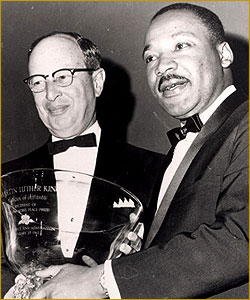- About
- Jewish Life
- Community
- Social Justice
- WELC Preschool
- Education
- Calendar
- Streaming & Service Archives
HISTORY
 The Temple, founded as the Hebrew Benevolent Congregation in 1867, was Atlanta’s first official Jewish institution growing out of the Hebrew Benevolent Society, organized in 1860 to obtain a burial ground and provide relief for the Jewish poor.
The Temple, founded as the Hebrew Benevolent Congregation in 1867, was Atlanta’s first official Jewish institution growing out of the Hebrew Benevolent Society, organized in 1860 to obtain a burial ground and provide relief for the Jewish poor.
Jews have lived in Atlanta since the very beginnings of the city, and while they were an integral part of the city’s commercial life, they represented a small minority of the population. In 1850, twenty-six Jews lived in Atlanta, representing just one percent of the population. Their numbers would double by the outbreak of the Civil War, prompting the fledgling community to create a loosely organized Hebrew Benevolent Society in 1860.
It was not until two years after hostilities ceased, amidst the rebuilding of a decimated Atlanta, that the community was able to found The Temple.
The Temple is currently in its third home. Our first building served us from 1877 to 1902 and was located at Garnett and Forsyth Streets, just a few blocks from the state capitol. The Temple then moved into a building at Pryor and Richardson Streets near where Turner Field now stands.
It began on the first day of January, 1867, when the Reverend Isaac Leeser of Philadelphia, presided over Atlanta’s first Jewish wedding, between Emilie Baer to Abraham Rosenfeld. Rabbi Leeser encouraged those in attendance to create a formal congregation. The Hebrew Benevolent Congregation received a charter four months later. In 1875, they built the first permanent worship hall in downtown Atlanta.
Over the first twenty years of it’s existence, The Temple shifted back and forth between Reform Judaism and a more traditional observance. A number of rabbis were hired, and fired, depending on which faction was stronger at any given moment. The arrival in 1895 of Rabbi David Marx marked the end to this period and the beginning of decades of stability. Learn more about Reform Judaism.

Rabbi Marx was only 23-years-old when he came to The Temple. Over the course of his 51-year tenure, which ended just after World War II, he pushed The Temple further into classical Reform Judaism, solidifying our place as a leading member of the Union for Reform Judaism. His efforts helped to quell earlier controversy between traditionalists and reformers, but it also helped strike a delicate balance between Atlanta’s Jewish and gentile communities. Continue reading about Rabbi Marx.
 His successor, Rabbi Jacob Rothschild, arrived in 1946. While he rolled back some of the reforms of Rabbi Marx’s tenure, he continued his predecessor's outreach to Atlanta’s Christian community. He was, however, much more willing to speak out in support of social justice, even when it angered some in the larger community. Continue reading about Rabbi Rothschild.
His successor, Rabbi Jacob Rothschild, arrived in 1946. While he rolled back some of the reforms of Rabbi Marx’s tenure, he continued his predecessor's outreach to Atlanta’s Christian community. He was, however, much more willing to speak out in support of social justice, even when it angered some in the larger community. Continue reading about Rabbi Rothschild.

This climate of moderation was shattered on October 12, 1958. A group of white supremacists, angered by The Temple’s ongoing and vocal support of civil rights, placed fifty sticks of dynamite by the north entrance to The Temple. Continue reading about The Temple Bombing.
On December 31, 1973, Rabbi Rothschild died suddenly of a heart attack. His successor, Rabbi Alvin Sugarman, continued the tradition of stability at the position of senior rabbi, serving for more than three decades until 2004.
His tenure came at a time of unrivaled growth and prosperity for Atlanta’s Jewish community. From a population of roughly 28,000 in 1980, the Jewish community of metro Atlanta grew to over 120,000 by 2006. Jewish business leaders and Temple members have largely been behind this massive growth, helping to build Atlanta into a corporate center of the South.
The Temple has also grown in those years. In 1985, The Temple Zaban Paradies Center began operating on our campus, providing a place to stay for homeless couples. Housed in the Selig Building, the center operates nightly from October through May, a tangible extension of The Temple’s ongoing commitment to social justice.
In 2004, at the end of Rabbi Sugarman’s tenure, we also completed a major renovation and expansion of The Temple campus. The main sanctuary was restored, while the rest of our facilities were renovated and expanded.
Along with the completion of our campus expansion, we also launched the Weinberg Early Learning Center, Atlanta’s premiere Jewish center-based school. The WELC has helped us carry forward our mission of learning from the earliest ages to the eldest.
The Temple houses a Torah from the Pinkas Synagougue in Prague that was part of the treasures looted by the Nazis from the desolated Jewish communities of Bohemia, Moravia and Slovakia. Read more about the 1564 scrolls that were saved, hidden, forgotten and saved again at www.memorialscrollstrust.org.
Under the leadership of our current senior rabbi, Peter S. Berg, The Temple is excited to continue both its incredible growth as well as its long history of social justice and Jewish leadership.
Mon, November 3 2025
12 Cheshvan 5786
Update
Today's Calendar
| Portugal Trip |
: 7:30am |
: 4:00pm |
: 4:00pm |
Upcoming Programs & Events
Oct 26 |
Nov 3 |
Nov 3 |
Nov 3 |
Nov 4 |
This week's Torah portion is Parashat Vayeira
| Shabbat, Nov 8 |
Erev Hanukkah
| Sunday, Dec 14 |
this content.






